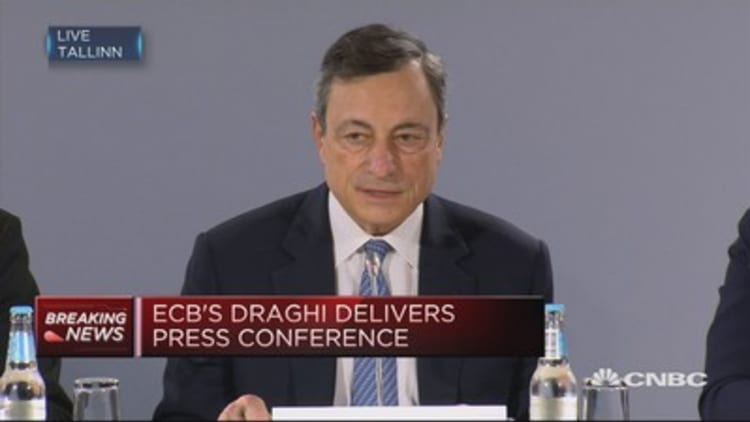
The euro saw a sharp turn lower on Thursday afternoon after the European Central Bank (ECB) announced a downward revision to its inflation projections.
Mario Draghi, president of the ECB, said that the central bank now anticipates inflation levels of 1.5 percent in 2017, 1.3 percent in 2018 and 1.6 percent in 2019. This is down from the forecasts released in March, which saw inflation reaching 1.7 percent in 2017, 1.6 percent in 2018 and 1.7 percent in 2019.
The shared currency was previously trading at $1.1240 ahead of the announcement but dropped to $1.1207 against the greenback. At 2.30 p.m. London time it was trading close to $1.220.
Draghi said that the downgrade reflected recent drops in the price of oil, adding that headline inflation is likely to remain at current levels based on current prices for oil futures.

He stated that underlying inflation - which gives less weight to prices that fluctuate substantially - is expected to rise only gradually over the medium term, "supported by our monetary policy measures, the continuing economic expansion and the corresponding gradual absorption of economic slack."
The forecasts remain well below the central bank's inflation target of below but close to 2 percent.
'Broadly balanced'
Earlier in the day, the central bank announced that it would hold interest rates steady at 0.0 percent when it met in Tallinn, Estonia on Thursday.
While the decision was largely anticipated, market watchers keenly noted the absence of the bank's long-standing reference to "downside risks" to the euro zone's economic outlook.
In its monthly update, the ECB omitted any indication that interest rates would be cut again and Draghi insisted that risks within the region were now "broadly balanced."
"The information that has become available since our last monetary policy meeting in late April confirms a stronger momentum in the euro area economy, which is projected to expand at a somewhat faster pace than previously expected. We consider that the risks to the growth outlook are now broadly balanced," he told a press conference of journalists.
Though ECB members did not cast a vote on the decisions, Draghi told CNBC that he "didn't hear any dissenting voice with respect to the proposals."
Draghi also said that the ECB expects interest rates to "remain at present levels for an extended period of time," but said that the bank would be ready to extend its quantitative easing (QE) program if needed.

Timothy Graf, head of macro strategy at State Street Global Markets, told CNBC via email that improved European data would likely support the euro and risky assets over the rest of the year, but said the central bank was in no hurry to rescind its accommodative policy.
"The tone to European data has clearly been positive this year and should support the single currency and European risky assets
The ECB has confirmed that it will continue its
Though the euro dipped in the immediate wake of the announcement, Graf said that the shared currency would likely hold its strength. However, he added that the inflation levels would need to show further upwards movement before the euro would see a significant uptick.
"Today's announcements largely met expectations, so recent euro strength will likely hold; however, with


